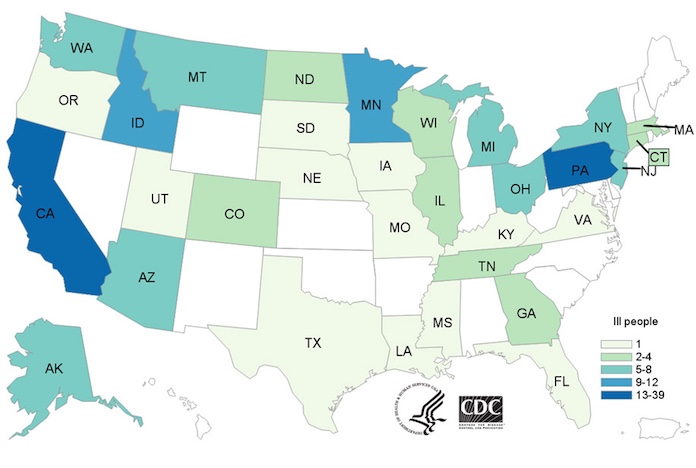Lawsuits are being filed as the deadly E. coli O157:H7 HUS outbreak linked to romaine lettuce has now sickened 172 people in 32 states. That’s an addition of 23 more ill persons since the last update 7 days ago. And three more states have reported patients: Iowa, Nebraska, and Oregon.

The patient case count by state in this deadly E. coli O157:H7 outbreak is: Alaska (8), Arizona (8), California (39), Colorado (3), Connecticut (2), Florida (1), Georgia (4), Idaho (11), Illinois (2), Iowa (1), Kentucky (1), Louisiana (1), Massachusetts (3), Michigan (5), Minnesota (12), Mississippi (1), Missouri (1), Montana (8), Nebraska (1), New Jersey (8), New York (5), North Dakota (2), Ohio (6), Oregon (1), Pennsylvania (21), South Dakota (1), Tennessee (3), Texas (1), Utah (1), Virginia (1), Washington (7), and Wisconsin (3). Seventy-five people have been hospitalized. Twenty people have developed HUS. And one person, in California, has died.
In addition, the Public Health Agency of Canada has identified six persons in that country who are part of this outbreak. The case count in Canada is: British Columbia (1), Alberta (1), Saskatchewan (2), and Ontario (2).
Illnesses in America started on dates ranging from March 13, 2018 to May 2, 2018. The patient age range is still from age 1 to 88. Of 157 people interviewed by public health officials, 75, or 48%, have been hospitalized, which is a percentage much higher than the usual 30% in Shiga toxin-producing E. coli outbreaks.

If you or a loved one has been diagnosed with an E. coli infection, you can contact attorney Fred Pritzker for help by calling 1-888-377-8900 or 612-338-0202.
Food safety attorney Fred Pritzker, a lawyer who is representing patients in this outbreak, said, “There may be more patients added to this outbreak, since it can take some time from when a person gets sick to when a report is made to the government.” Lawyers have filed lawsuits against Panera, Red Lobster, Texas Road House, and Papa Murphy’s restaurants.
The investigation is still ongoing, and government officials have still not pinpointed the farms, distributors, brands, grocery stores, and restaurants that handled the romaine. Information still indicates that romaine lettuce was from the Yuma, Arizona growing region.
The FDA has determined that the last shipments of romaine lettuce from the Yuma area were harvested on April 16, 2018. The harvest season is now over. The report states, “It is unlikely that any romaine lettuce from the Yuma growing region is still available in people’s homes, stores, or restaurants due to its 21-day shelf life. The most recent illnesses reported to CDC started when romaine lettuce from the Yuma growing region was likely still available in stores, restaurants, and in peoples’ homes.”
So the CDC is updating its advice to consumers, saying that it is unlikely that any romaine lettuce from Yuma is still available in stores or restaurants. The product has a 21-day shelf life. Officials stopped short of saying that romaine is generally safe to eat again. They still advise consumers to ask where the romaine they are buying or ordering came from.
The symptoms of a potentially deadly E. coli O157:H7 infection include severe and painful abdominal and stomach cramps, and diarrhea that is watery or bloody. The symptoms of HUS include little or no urine output, lethargy, pale skin, easy bruising, and bleeding from the nose or mouth. Anyone with these symptoms must see a doctor immediately, since an E. coli infection and HUS can be deadly.
The law firm of Pritzker Hageman helps people sickened by contaminated food such as contaminated produce protect their legal rights, and get justice and compensation. Our attorneys represent patients and the families of children sickened with bacterial infections in wrongful death and personal injury lawsuits, such as this deadly E. coli O157:H7 outbreak, against farmers, retailers, food producers, food processors, grocery stores, restaurants, and others. Attorney Fred Pritzker and his team of experienced attorneys won $7.5 million in 2016 for young client whose kidneys failed because he developed hemolytic uremic syndrome after an E. coli infection. Class action lawsuits may not be appropriate for outbreak victims because the cases are so very unique.




